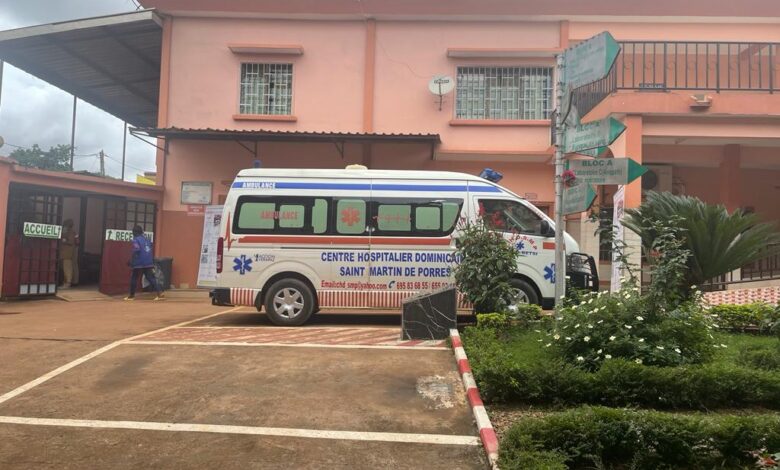Cameroonians Turn To Apps, Nigerian Hospitals As War Prevents Access To Healthcare
Roadblocks and the imposition of unlawful curfews by separatists are frustrating access to healthcare in the two English-speaking regions, with fatal consequences.

Nkwa Pascaline, 69, suffers from a bone disorder. She needs to travel over 100 kilometres from her village in Mbengwi, North West Cameroon, to Bafoussam, the headquarters of the country’s West region, to carry out a computerised tomography (CT) scan. But she has not been able to do so for the past two years. The reason? Roadblocks and the imposition of an unofficial curfew – usually affecting Mondays – by Anglophone separatists known as ‘ghost town’.
The ghost town ritual has been in place in parts of Cameroon since 2017, almost for as long as the country has fallen into a deadly socio-political crisis.
Before the conflict, Pascaline made this journey to carry out her regular consultations due to the absence of this service at the Bamenda Regional Hospital in her community. Now, she has no choice but to miss her appointments.
“I spend more on ghost town days because I would go before the day of my appointment and rent a hotel room,” she said. Her 26-year-old son often accompanies her to these appointments in Bafoussam because of the risks.
Pascaline was glad when Cameroon’s Ministry of Public Health finally got CT scanners for the hospital in Bamenda in February last year because it meant she no longer had to embark on the three-hour trip to Bafoussam. But her troubles are still not over.
The violent attacks and constant restrictions to movements imposed in her area by separatists continued to cause her to miss her medical appointments.
“I am tired. I have accepted that anything can happen to me. When I have the chance, I go to the hospital. When there’s no chance, I stay here. I am really tired of all this [war],” she cried.
Just like Pascaline, many persons living in the Anglophone regions of Cameroon have experienced a series of ghost town curfews and roadblocks as a result of the ongoing conflict. Separatists impose these restrictions in defiance of the government as they push for independence over the two English-speaking regions of the country.
The UN humanitarian agency says insecurity in these regions has forced over 18 per cent of health facilities to close as of April. Many of those still operating and struggling. Health workers have also deserted many hospitals in the area. Three attacks on health structures and personnel were recorded in May alone.
Last Sunday, a priest in Isanguele, sent a distress call to the authorities on the rise of infant mortality due to the lack of health staff. Isuanguele is a small fishing community along the Akpa Yafe River, which is close to the border with Nigeria.
Rev. Fr. Elias Mengnjo Bongayen told the Divisional Officer he had just witnessed the burial of two babies whose mothers didn’t have access to care due to the understaffing of health facilities.
“We have three cases of pregnant women who could not be assisted medically due to the absence of personnel in the hospital. Two women lost their babies today, and at least one case was successful,” he said.
The priest sent one of the mothers, who was in a critical condition, to neighbouring Nigeria for treatment. He narrated how an elderly woman in the community helped to deliver the babies since the only worker at the hospital said she was incompetent for the task. “The nurse on duty did not know how to handle the situation. We were helpless,” the Reverend Father cried out.
The pregnant women could not be transported to other parts of the South West region due to an ongoing ghost town curfew imposed by separatists to last between Sept. 4 and 14.
Reach Out and the Cameroon Baptist Convention Health Services, two non-governmental organisations, partnered with UNOCHA last year to help tackle the healthcare challenges in the affected regions. They reached over 25,000 people in five districts with essential health services last year. Their mobile clinics also eased vaccination campaigns.
But the gap in the sector is still huge.
“As of June 2023, partners had received only 33.4 per cent of the US$25.5 million requested for health response in Cameroon. A lack of adequate health care and services will have devastating consequences for more than 1 million people, including women, children and people with disabilities,” warned OCHA.
Mobile clinics could not access some areas due to insecurity. For Ngem Elias, who has been living in Bamenda since the war started, it was initially difficult to access healthcare.
“Right now, we are surviving. If I don’t feel well, I consult on the internet. I talk to a doctor and he directs me on what to do or what to take. I take his prescriptions to my friend who works at a pharmacy, and I get my drugs,” he said.
The use of internet applications is gaining ground in Cameroon, especially in the English-speaking regions. Waspito, Urpharm, and Borne-Fyne are some of the solicited health applications used by locals who are confined to their homes.
The ongoing war in the region turned violent in 2016. It has led to the internal displacement of more than 630,000 people, while another 86,000 people are seeking refuge in neighbouring Nigeria.
Summary not available.
Support Our Journalism
There are millions of ordinary people affected by conflict in Africa whose stories are missing in the mainstream media. HumAngle is determined to tell those challenging and under-reported stories, hoping that the people impacted by these conflicts will find the safety and security they deserve.
To ensure that we continue to provide public service coverage, we have a small favour to ask you. We want you to be part of our journalistic endeavour by contributing a token to us.
Your donation will further promote a robust, free, and independent media.
Donate HereStay Closer To The Stories That Matter




